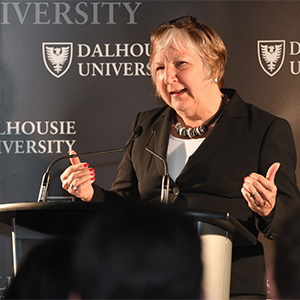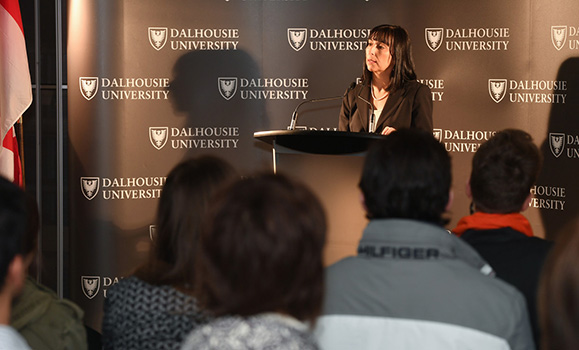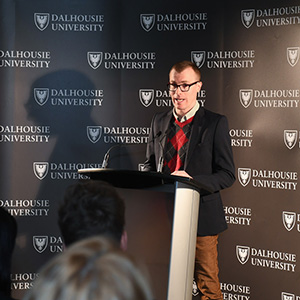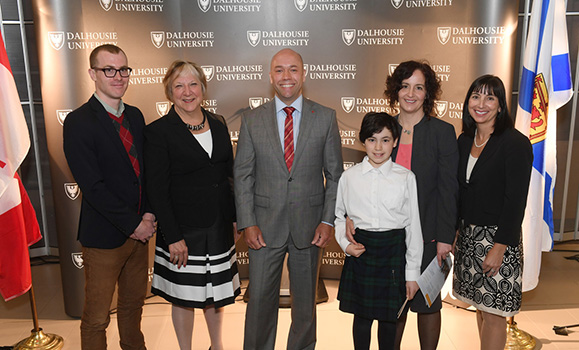What can community groups in Halifax learn about gang prevention from their counterparts in Surrey, B.C.? What strategies for fighting youth suicide in Arctic communities might also work in southern Alberta?
These are the sorts of questions that fuel the work of Children and Youth in Challenging Contexts (CYCC), a Dalhousie-based, national knowledge-mobilization network with more than 250 members spanning multiple sectors across the country.
The network, which first emerged in 2011 out of a partnership between three prominent research groups at Dal, supports researchers, policy makers, front-line practitioners and others working to improve the lives of vulnerable children and youth in Canada by facilitating the creation of knowledge and sharing of best and promising practices.
Andy Fillmore, Member of Parliament for Halifax, visited campus on Monday to celebrate a renewal of support for the group's work in this area in the form of a new $1.2-million investment.
Fillmore said the CYCC and other networks like it are able to make an impact at the grassroots level in emergency rooms, schoolyards and local communities where it is needed most.
“The support for networks such as CYCC demonstrates our government’s commitment to initiatives that get research knowledge into the hands of those who can put it into practice,” Fillmore told a crowd gathered in the atrium of the Mona Campbell Building, host to the School of Social Work — the Dal department most closely linked to the CYCC.
Transferring important knowledge
The funding, to be spread out over three years, was first announced Friday at an event in Kingston, Ont., where one of two other similar networks also receiving renewal funding from the government’s Networks of Centres of Excellence (NCE) is based.
Martha Crago, vice-president of research at Dal and master of ceremonies of Monday’s event, thanked the government for its renewed financial commitment through the NCE’s Knowledge Mobilization program and praised CYCC for its bi-directional approach to knowledge transfer.
 “It moves in both directions,” said Dr. Crago. “The practitioners get information from the university and the university gets information from the practitioners and from the work that they do with children and youth.”
“It moves in both directions,” said Dr. Crago. “The practitioners get information from the university and the university gets information from the practitioners and from the work that they do with children and youth.”
Over the past few years, CYCC has developed a tool kit that enables community-based organizations to do their own evaluations and create their own evidence of effective practice that can be shared with others. The network has also worked with three regional hubs — in Ontario, Quebec, and Nunavut — and affiliates in other provinces and territories to bring together communities of practice that serve to connect groups and individuals working on similar issues, whether it be gang violence or refugee settlement.
Strength through partnership
Dal Social Work Professor Michael Ungar, one of CYCC's founders and its scientific director, was unable to attend Monday’s announcement as he was at an international conference but said in an interview last week that the new funds will enable the network to expand some of these existing initiatives and undertake ambitious new ones.
One upcoming project will tap into the specialized knowledge the Ontario Centre of Excellence for Child and Youth Mental Health (one of the network’s three regional hubs) to work on coaching community organizations that want to adopt new practices.
The Ottawa-based partner has been doing this kind of work for years in its home province and will assist CYCC in rolling out a similar program on a national scale from "coast to coast to coast," said Dr. Ungar.
"As easy as it sounds, it actually takes a fair bit of skill to reach out, find a new practice, bring it into your organization, not ruffle everyone's feathers, and get it adopted,” he said.
Supporting youth
CYCC executive director Lisa Lachance and Wanda McDonald, vice-chair of the network’s board, were both on-hand Monday and spoke about some of the group’s recent successes.

McDonald celebrated what she called a “landmark” event in Toronto in early March that brought together 130 individuals to share best practices for supporting incoming refugee children and youth.
“A community of practice has been established to move the conversations from this event into action,” said McDonald, who also works in mental health and addictions policy development with the Nova Scotia Health Authority. “It was a privilege for me to be a part of this event and see knowledge mobilization in action and to see how young people themselves are such an integral part of this process.”
Lachance echoed McDonald’s emphasis on the value of youth engagement to the success of many programs targeting at-risk young people. She said it is one of the many promising practices recently identified by CYCC and its partners and worked into its written and online tool-kit materials. She also thanked the hundreds of students from the bachelor to post-doctoral levels who have helped bring a multidisciplinary character to CYCC’s work.
 “These are complex issues and we’re not going to find the solutions from simply one discipline or one viewpoint,” said Lachance.
“These are complex issues and we’re not going to find the solutions from simply one discipline or one viewpoint,” said Lachance.
Jimmy Bray, a Dal Law student who has co-led two major partner reports and an evaluation for the network, said he’s thankful for the skills he’s gained and for the opportunity to work in such an important area.
“There’s a great deal of work to be done in this field,” said Bray. “I’m proud that the network has chosen to invest in young people who can carry this work into the future and ensure the lessons we are learning about working with vulnerable young people are not lost.”

Comments
comments powered by Disqus

